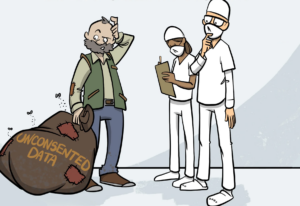With the huge ruling from the US Department of Justice that Google is a “monopolist” when it comes to search, the regulatory future of online search is being questioned – a scary thought for many marketers.
The crux of the case is that Google pays companies to ensure a user’s browser is directed to Google Search by default. Apple is a notable example: Every Safari search on iPhones and Macs routes straight to Google. Between these deals and the prevalence of the Chrome browser and Android OS globally, Google has 91% market share among search engines.
Google’s dominance isn’t news to marketers. But the reality that marketers must remember is an antitrust ruling doesn’t actually change user behavior. The “Kleenex effect” is still a thing. “To google” is a verb in the Oxford English dictionary. Google’s cultural prevalence isn’t going anywhere.
Still, with a landmark ruling potentially forcing Google to change its business practices, who is actually likely to steal some of its search market share? And what should marketers do about it?
AI contenders are hot – but mostly for B2B
Everyone is looking at new players like OpenAI’s SearchGPT, Copilot for Microsoft 365 and Perplexity. They handle more complex prompts and offer more sophisticated outputs than Google Search in some cases.
But these tools are more often discussed for business use cases, from copy generation to creating scripts to analyzing thousands of rows of data. It remains to be seen if these tools are ready for the general population’s search needs. And with fewer ad products and nowhere near the depth of data that Google has, they’ll be an unlikely fit for mainstream advertisers for a while.
The tech-savvy users who might defect to Perplexity or SearchGPT are more likely to attract B2B ad dollars because of their demographics and search intent. Google’s revenues are much less reliant on B2B advertisers than B2C, but B2B SaaS marketers should consider sandbox testing (not that Sandbox) once ad units are available, in the hopes of scoring some cheaper CPCs.
For B2Cs outside the tech vertical, don’t worry about reaching your buyers through AI chatbots for at least 12+ months.
Retail and marketplaces are a far larger threat
Users with shopping intent are more frequently beginning their searches directly in marketplaces and commercial environments. This phenomenon has long been documented with Amazon, and now with the success of the TikTok Shop.
Google’s Shopping experience is most at risk here, but only small percentages of consumers have made these behavioral changes.
Still, any retailers that aren’t considering Amazon as part of their broader search strategy risk falling behind soon.
Retailers can improve visibility and find new growth opportunities by coordinating their website’s search engine marketing and search engine optimization with content from marketplace product detail pages and sponsored keywords.
Social players want to enter search, but it’s early
Meta is the only company beside Google that is sitting on enough consumer data to power truly personalized experiences with AI.
However, Meta is unlikely to cut into search activity – for now. The integration of Meta AI in feeds, chats and search has been limited, since it is not yet aligned with user behaviors on Instagram, Facebook and WhatsApp.
Reddit is making some dents in search – a growing number of searches include “Reddit” to help users find peer-created information. But Reddit is nowhere close to actually pulling users away from originating their searches on Google.
Bing isn’t the thing
Even with the closest US market share to Google, Microsoft’s Bing Ads is unlikely to be a powerful enough competitor to draw users away, since Microsoft does not have a history of investing in search innovation. Most of Microsoft’s ad products have followed Google’s lead.
Today, Bing mainly has traction with B2B advertisers because of the prevalence of Windows PCs in the workplace – so marketers should plan for business as usual.
A possible dark horse: tech collaborations
If Google’s existing Apple partnership is eventually deprecated to be compliant with antitrust law, Apple and OpenAI potentially partnering would be fascinating. Such a relationship could impact Google’s market share if the Apple and Open AI user experience is strong and frictionless enough to entice savvy consumers.
If this partnership does come to fruition, since Microsoft owns the ad rights on ChatGPT, marketers should make sure their Bing Ads accounts are ready to fire on all cylinders. Update your conversion tagging, audience lists, negative keywords, etc.
No matter which way the competition shakes out, the ruling that Google is a “monopolist” and violating antitrust law is a landmark moment for the entire tech industry.
Nothing is set in stone, and we’re far from seeing any immediate impacts. Google is planning to appeal the decision, which could take years. It’s also facing another antitrust trial starting in September. And then there’s this year’s presidential election, which could dramatically reshape the regulatory landscape.
But for marketers trying to look ahead, preparing today to capitalize on new opportunities on other platforms could pay off massively in 12 to 18 months.
“Data-Driven Thinking” is written by members of the media community and contains fresh ideas on the digital revolution in media.
Follow Monks and AdExchanger on LinkedIn.


















